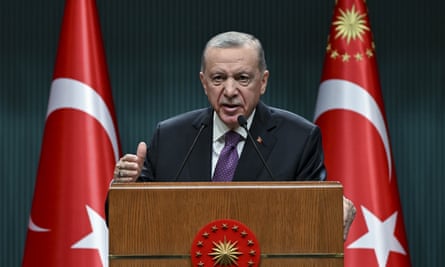Turkey’s president, Recep Tayyip Erdoğan, will be arriving in Athens on Thursday for the first time in six years, determined to move on with a “win-win approach” from the disputes and tensions left by his previous trip to the city.
The last time the Turkish leader visited the Greek capital – exactly six years ago to the day – what had been billed a historic tour descended into a verbal theatre of war as Erdoğan, dispensing with diplomatic niceties, went on the offensive.
Within an hour of stepping off the plane, he had: questioned the treaty delineating the borders between the two neighbours; raised the thorny question of war-split Cyprus; fulminated over the treatment of the Muslim minority in Thrace; and chastised the Greeks for their handling of Ottoman sites, a legacy of 400 years of Ottoman rule.
“We still haven’t forgotten it,” said one well-placed diplomat. “It was as if he was a boxer in the ring, throwing punches from beginning to end.”
From then on, bilateral ties only worsened, with the two Nato rivals nearly going to war over disputed undersea energy resources; Athens accusing its neighbour of “weaponising” migration and Ankara questioning the ownership of outlying Greek islands.
During Thursday’s visit – expected to last barely six hours – the famously unpredictable leader will put pugilism aside.
What he lacks in time, Erdoğan says, will be made up in friendship, with a charm offensive aimed not only at building bridges but sending a concerted message of peace at a time when the war in Gaza is stirring trouble in the eastern Mediterranean.
“We will go to Athens with a win-win approach,” he told reporters aboard the presidential plane as he returned from the Cop28 climate summit.
“There, we will discuss both our bilateral relations and Turkey-EU relations in order to make decisions worthy of the spirit of the new era.”
On Wednesday the 69-year-old president went further, telling the Greek daily Kathimerini there was no problem the two countries could not overcome.

Erdoğan said: “Whether it’s the issues in the Aegean, joint efforts against irregular migration, ongoing problems of the Turkish minority in Greece, there is no problem that we cannot solve through dialogue based on mutual goodwill.”
At least eight cooperation deals, ranging from increasing bilateral trade to agreeing a migration accord that would see coastguard officials from both nations establish lines of direct communication, are slated to be signed.
The dramatic fall in migration flow from Turkey in recent months has been indicative of the improvement in ties.
Erdoğan said that, by the time he leaves Athens, he hopes the two sides will have inked a “declaration of friendly relations and good neighbourly cooperation … to formalise this mutual intent”.
Analysts believe better ties with Greece will also be key to repairing Turkey’s strained relationships with the European Union and other western allies.
But while Turkey’s devastating earthquake in February and a deadly train crash in central Greece had gingerly edged the neighbours towards rapprochement, officials believe longstanding volatile disputes will be bypassed on Thursday.
Instead, the delegations are likely to focus on “low politics” that can easily deliver fruit.
Greece and Turkey remain at odds over a host of issues including maritime boundaries, the extent of their continental shelves and airspace over the Aegean, although hostility can be traced back to the subjugation of Greeks under Ottoman rule before a bloody war of independence led to the creation of the modern Greek state in 1830.
The continued division of Cyprus – invaded by Turkey in 1974 after a coup aimed at union with Greece – has remained a perennial thorn in relations.
But there are mounting signs that in Ankara and Athens, officials are eager to concentrate on bilateral relations beyond the constraints imposed on both capitals by the unresolved Cyprus problem.
With Erdoğan and Greek prime minister Kiriakos Mitsotakis re-elected this year and enjoying comfortable majorities, diplomats agree the leaders have the room to concentrate on domestic issues.
Improved bilateral ties are seen as beneficial to the respective economic focus the two men share, with Greece on a growth spurt after a decade of financial turmoil and Turkey battling crippling inflation and shaky international investment.
The vice-president of the German Marshall Fund of the United States, Ian Lesser, said: “Both countries have very practical interests in having a more stable relationship,” noting that being on a near constant war footing in the Aegean was a costly business.
“Defence spending requirements driven by tense relations are very high,” he added.
“Turkey has other challenges in the Black Sea and with Nato. There’s a desire to stabilise relations with Washington and Brussels through Greece and detente in the Aegean.”
Since the establishment of the Turkish republic 100 years ago, there have been other periods of detente, most noticeably in the 1930s and 1990s, when the neighbours reconciled after suffering devastating earthquakes within weeks of each other.
Lesser said the big question now was not whether either side wanted rapprochement but how long it would last.
Eighteen months ago, lines of communication between Athens and Ankara stopped altogether when Erdoğan, irked by growing US-Greek relations, announced he would never talk to Mitsotakis again.
“There is a mercurial quality to foreign policy shaped by individual strong leaders,” Lesser said, referring to Erdoğan’s reputation for unpredictability.
“It can be threatening and destabilising but, on occasion, also produce positive openings. The question now is will it, can it, be durable?”









































